法语发音规则大全
法语读音规则总结

• [sjɔ̃] -tion前面无s nation • [stjɔ̃] -stion question • ti的发音: 当ti后面是元音字母,而t前又没有[s]音时,ti读 [si](后面无元音)或[sj](后面有元音),如 :démocratie [demɔkrasi] 民主n.f., partiel [parsjεl] 部分的,局部的;如果有[s]音,发音 就要变。如: question [kεstjɔ̃] 但有一例外:frontière [frɔ̃tjε:r] 边界n.f. Tiens! • 辅音[t],[d]在半元音[j]前时,常有颚化现象。也就 是说发音部位从舌尖与牙齿到舌面中部,并向前 硬腭抬起,有些像汉语中的“j”音。如:cordial [kɔrdjal], tiède [tjεd]。
• 字母cc [k] 在a, o, u 或辅音字母前 accuser [ks] 在e, i, y前 accès, accident • 字母sc [sk] 在a, o, u 或辅音字母前 scolaire [s]在e, i, y前 scène • 字母x 不发音 在词末 [ks] 字母x一般发[ks] texte taxi • ex (inex) 在词首+辅音 [εks] excès 在词首+元音 [εgz] exercice
3个半元音
• [j] i, y+元音 yeux 元音+il (词尾) accueil travail 元音+ill cueillir travailler [ij] 辅音+ill vrille 辅音+l或r (辅音群) + i + 元音 如:ouvrier [uvrije] bibliothèque [biblijɔtεk] [jɛ̃] ien后面无m,n或元音字母 bien Note: 字母ou在半元音[j]前仍然读[u]的音。 ail, aille 读[a:j]; eil, eille 读[ε:j]。travail réveil
法语读音规则一览表最全
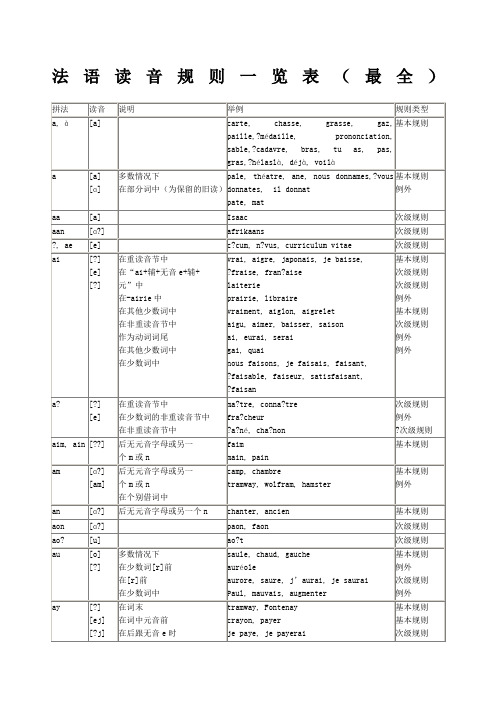
?agenda, mémento, pentagone,
?benzine, pensum, benjamin
Agen, Saint-Gaudens, Rubens,
?Stendhal
Eden, lichen, pollen, spécimen,
基本规则
基本规则
eu
[?] [?]
[y]
多数情况下
在词末开音节中
在[z][?][t][d]前
在eu-开头的词中
在其他少数词中
在avoir的变位形式中
heure, ils veulent, déjeuner
peu, deux, il peut, peut-être
creuser, précieuse, Maubeuge,
次级规则
例外
基本规则
次级规则
基本规则
é
[e]
[?]
多数情况下
在“é+辅+无音e+辅+
元”中
在其他个别词中
été
céleri, événement [ev?nmɑ?]
je crée
基本规则
次级规则
例外
è
[?]
mère, poète
基本规则
ê
[?]
[e]
在重读音节中
在“ê+辅+无音e+辅+
元”中
在个别词非重读音节
c?ur
sac, caduc, avec, lac, bec, Marc
ce, c?sium, civil, c?lacanthe,
?bicyclette
法语读音规则一览表(最全)
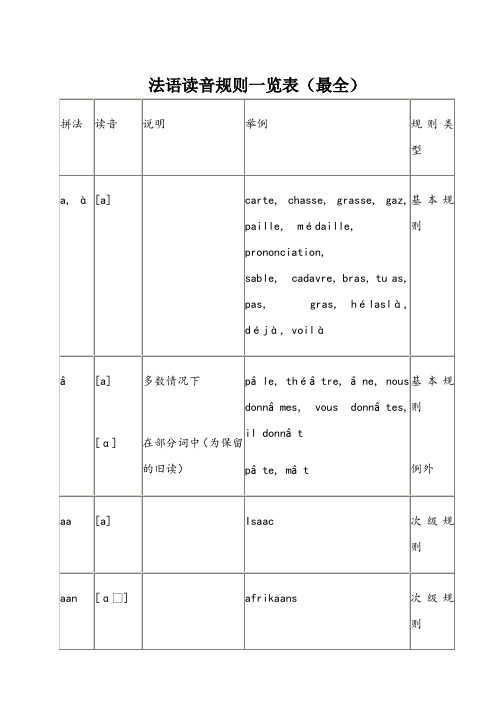
elle, perte, laine, fée, partie, aiguë
Jean, asseoir, remerciement
samedi
基本规则
基本规则
例外
次级规则
例外
基本规则
例外
基本规则
次级规则
次级规则
例外
例外
例外
基本规则
基本规则
基本规则
次级规则
后接元音字母,但在词首
在i后(但不在-enc-,
-ens-, -ent-结构中)
在y后
在é后
在某些拉丁语词和外
语借词中
在某些专有名词中
在少数拉丁语词末
entre, sens
enougueillir, enivrer
bien, rien, parisien
citoyen, moyen
européen, méditerranéen
[e]
在重读音节中
在个别词非重读音节中
在非重读音节中
neige, seize
treizième, seizième
neiger
基本规则
例外
基本规则
ein
[ɛ̃]
后无元音字母或另一个n
plein, éteindre
次级规则
em
[ɑ̃]
[ɛm]
后无元音字母或另一个m或n
在个别词中
temps, novembre
aspect, respect
基本规则
例外
d
[d]
无音
在词首和词中
在少数词末
在词末
deux, maladie, cadre
法语音素发音规则
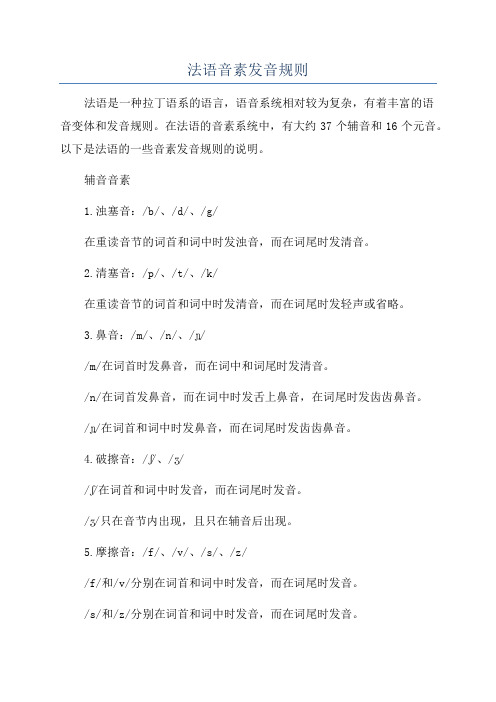
法语音素发音规则法语是一种拉丁语系的语言,语音系统相对较为复杂,有着丰富的语音变体和发音规则。
在法语的音素系统中,有大约37个辅音和16个元音。
以下是法语的一些音素发音规则的说明。
辅音音素1.浊塞音:/b/、/d/、/g/在重读音节的词首和词中时发浊音,而在词尾时发清音。
2.清塞音:/p/、/t/、/k/在重读音节的词首和词中时发清音,而在词尾时发轻声或省略。
3.鼻音:/m/、/n/、/ɲ//m/在词首时发鼻音,而在词中和词尾时发清音。
/n/在词首发鼻音,而在词中时发舌上鼻音,在词尾时发齿齿鼻音。
/ɲ/在词首和词中时发鼻音,而在词尾时发齿齿鼻音。
4.破擦音:/ʃ/、/ʒ//ʃ/在词首和词中时发音,而在词尾时发音。
/ʒ/只在音节内出现,且只在辅音后出现。
5.摩擦音:/f/、/v/、/s/、/z//f/和/v/分别在词首和词中时发音,而在词尾时发音。
/s/和/z/分别在词首和词中时发音,而在词尾时发音。
6.半浊辅音:/l/、/ʁ/、/j//l/在词首和词中时发音,而在词尾时发音。
/ʁ/在拼接或词首辅音后时发音,而在词尾或两个元音之间时发音。
/j/在词首和词中时发音,而在词尾时发音。
元音音素1.短元音:/i/、/e/、/a/、/ɔ/、/u/短元音发音短促,母音发音在法语中相对稳定。
2.长元音:/iː/、/eː/、/aː/、/ɔː/、/uː/长元音发音较长,有时似乎有两个音节。
3.鼻化元音:/ɛɛ/、/ɛɛ/、/œɛ/鼻化元音是由舌唇元音和鼻音结合而成的。
它们只出现在音节内。
4.元音组合有五个复合元音:/wa/、/ɔi/、/waː/、/we/、/wi/。
这些元音组合的发音依赖于元音之间的相互影响。
除了辅音和元音的发音规则外,法语中还存在许多连读和弱化规则,例如“liaison”和“elision”,这些规则使得法语音节连贯流畅。
总结上述是法语音素的一些基本发音规则。
然而,法语是一门富有变异性的语言,如果要完全掌握法语的发音规则,还需要深入研究浊音轻声、失音重叠、连读辅音、元音特定情况下的发音等复杂的音变现象。
法语读音规则完整版
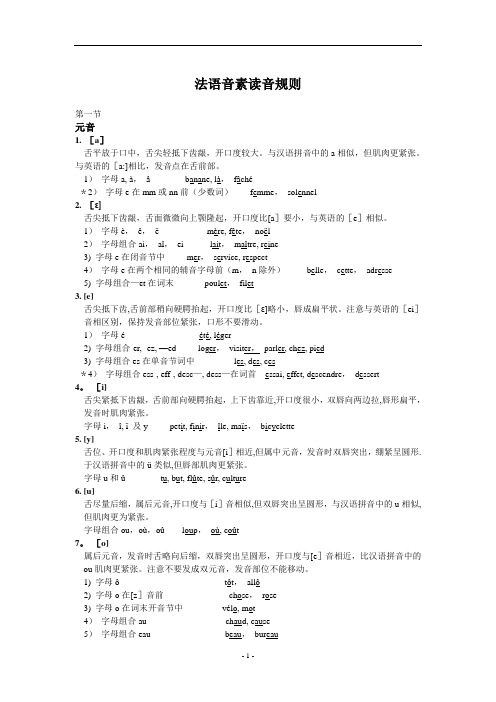
法语音素读音规则第一节元音1. [a]舌平放于口中,舌尖轻抵下齿龈,开口度较大。
与汉语拼音中的a相似,但肌肉更紧张。
与英语的[a:]相比,发音点在舌前部。
1)字母a, à,âbanane, là,fâché*2)字母e在mm或nn前(少数词)femme,solennel2. [ε]舌尖抵下齿龈,舌面微微向上颚隆起,开口度比[a]要小,与英语的[e]相似。
1)字母è,ê,ëmère, fête,noël2)字母组合ai,aî,ei lait,maître, reine3) 字母e在闭音节中mer,service, respect4)字母e在两个相同的辅音字母前(m,n除外)belle,cette,adresse5) 字母组合—et在词末poulet,filet3. [e]舌尖抵下齿,舌前部稍向硬腭抬起,开口度比[ε]略小,唇成扁平状。
注意与英语的[ei]音相区别,保持发音部位紧张,口形不要滑动。
1)字母éété, léger2) 字母组合-er, -ez, —ed loger,visiter,parler, chez, pied3) 字母组合es在单音节词中les, des, ces*4)字母组合ess-, eff-, desc—, dess—在词首essai, effet, descendre,dessert4。
[i]舌尖紧抵下齿龈,舌前部向硬腭抬起,上下齿靠近,开口度很小,双唇向两边拉,唇形扁平,发音时肌肉紧张。
字母i,î, ï及y petit, finir,île, maïs,bicyclette5. [y]舌位、开口度和肌肉紧张程度与元音[i]相近,但属中元音,发音时双唇突出,绷紧呈圆形.于汉语拼音中的ü类似,但唇部肌肉更紧张。
法语发音规则

8. 元音[R] 同英语[R]。字母o一般发[R]。
例 词:moto photo monnaie tomate
9. 元音[S] 口形同[o],但气流同时从口、鼻腔外出。字母on,om发[S]。
例 词:non bonbon maison tombe
例 词:là mal salle malade
4. 元音[y] 舌尖抵下齿,双唇突出呈圆形,开口度极小,读音近似中文"玉"。字母u,?发[y]。
例 词:tu salut statue usine
5. 元音[e]近似英语[e],但开口度较小,字母é,词尾-er,ez发[e],es在少数单音节词中发[e]。
10. 元音[u] 同英语[u:]但不延长读音。字母ou,où,o?发。
例ห้องสมุดไป่ตู้词:où nous jour soupe
11. 元音[D] 发音部位同[D],但气流同时从口、鼻腔外出。字母an,am,en,em发[D]。
例 词:enfant manteau lampe ensemble
12. 元音[Y] 发音部位同[ε],但气流同时从口、鼻腔外出。字母in,im,ein,ain,aim,yn,ym发[Y]。
例 词:pain fain magasin syndicat
13. 元音[?],但双唇突出略呈圆形。字母e在单音节词及词首开音节发[?]。
例 词:je menu demain semaine
14. 元音[O], 发音同[?],但肌肉更紧张,双唇突出呈圆形。字母eu,Ou发此音。
例 词:neuf facteur bOuf sOur
法语发音规则范文

法语发音规则范文法语是一种拉丁语系的语言,因此它与其他拉丁语言存在一些相似之处。
然而,法语也有一些独特的发音规则和特点,使它成为一门独特的语言。
下面是一些常见的法语发音规则及其例子。
元音发音:1. a(/a/)- 类似于英语单词"father"中的发音。
例如:après(/apʁɛ/)- 意为"后来"。
2. e(/ə/)- 中性的"uh"音,类似于英语单词"the"中的发音。
例如:le(/lə/)- 意为"the"。
3. i(/i/)- 类似于英语单词"see"中的发音。
例如:il(/il/)-意为"他"。
4. o(/o/)- 类似于英语单词"oat"中的发音。
例如:bon(/bɔɔ/)- 意为"好"。
5. u(/y/)- 类似于英语单词"few"中的发音。
例如:lundi(/lœɔdi/)- 意为"星期一"。
辅音发音:1. b(/b/)- 类似于英语中的发音。
例如:bonjour(/bɔɔʒuʁ/)- 意为"你好"。
2. d(/d/)- 类似于英语中的发音。
例如:deux(/dø/)- 意为"两个"。
"兄弟"。
4. k(/k/)- 类似于英语中的发音。
例如:carte(/kaʁt/)- 意为"卡"。
5. p(/p/)- 类似于英语中的发音。
例如:paris(/paʁi/)- 意为"巴黎"。
6. s(/s/)- 在元音前面时发"/z/"音,其他情况下发"/s/"音。
例如:rose(/ʁoz/)- 意为"玫瑰";pays(/pɛi/)- 意为"国家"。
法语发音规则

法语发音规则引言法语是一门美丽而优雅的语言,发音的准确性对于研究和掌握法语至关重要。
本文将介绍一些重要的法语发音规则,帮助您更好地发音和表达法语。
重点发音规则1. 元音音标:法语中共有17个元音音标,包括9个前元音和8个后元音。
这些音标的正确发音对于准确表达法语单词至关重要。
元音音标:法语中共有17个元音音标,包括9个前元音和8个后元音。
这些音标的正确发音对于准确表达法语单词至关重要。
2. 辅音音标:法语中的辅音音标和英语有很大的不同,例如法语中没有清音和浊音的区别,而且辅音音标的发音方式也有所不同。
辅音音标:法语中的辅音音标和英语有很大的不同,例如法语中没有清音和浊音的区别,而且辅音音标的发音方式也有所不同。
3. [ə]音:法语中有一个特殊的音,被称为中央[ə]音,它在很多单词中是非常常见的,例如"le"、"de"等。
[ə]音:法语中有一个特殊的音,被称为中央[ə]音,它在很多单词中是非常常见的,例如"le"、"de"等。
4. 重音:法语中的重音通常落在最后一个音节上,但也有一些例外。
了解单词的重音位置对于正确发音非常重要。
重音:法语中的重音通常落在最后一个音节上,但也有一些例外。
了解单词的重音位置对于正确发音非常重要。
5. 连读:法语中的连读现象比较普遍,特别是在单词之间的连接和句子中的流畅表达上。
了解连读规则可以更好地理解和使用法语。
连读:法语中的连读现象比较普遍,特别是在单词之间的连接和句子中的流畅表达上。
了解连读规则可以更好地理解和使用法语。
其他发音规则除了以上重点规则之外,还有一些其他的发音规则需要注意:- 字母组合:法语中的很多字母组合有特殊的发音规则,例如"oi"发音为/wa/,"ch"发音为/ʃ/等。
字母组合:法语中的很多字母组合有特殊的发音规则,例如"oi"发音为/wa/,"ch"发音为/ʃ/等。
(完整)法语发音规则汇总版,推荐文档
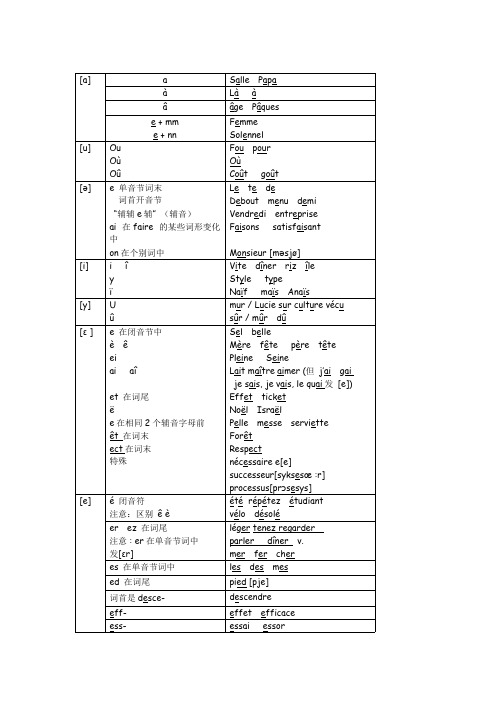
a
Salle Papa
à
Là à
â
âge Pâques
e + mm
Femme
e + nn
Solennel
[u] Ou
Fou pour
Où
Où
Oû
Coût goût
[ə] e 单音节词末
Le te de
词首开音节
Debout menu demi
“辅辅 e 辅” (辅音)
Vendredi entreprise
ed 在词尾
pied [pje]
词首是 desce-
descendre
eff-
effet efficace
ess-
essai essor
ai 特殊 [oe] eu
oeu oe 在个别词中 ueil 在 c 或 g 后读[oej] 个别外来语中 [] eu œu 1 词末开音节
2 [z ]音前
3 少数词中
courageux feu bleu jeux heureux bœufs[b] vœu 2 vendeuse / creuser précieuse (a.) heureuse jeudi / neutre 中立的 Europe (f.) émeute 骚乱 facteur sœur heureux œuf porte comme téléphone aurore (晨曦 f.) Au revoir. [ɔ r(ə)vwa :r] alcool maximum [maksimɔm] (m.) minimum ôter 拿走 v. / tôt côte hôpital m.[o(ɔ)] faute /chaud gauche augmenter aurore seau(桶 m.) / beau eau(水 f.) bureau solo[sɔlo] / stylo métro rose / chose [∫oz]
法语语音基本规则表

不发音
[e]
[ε]
[ε]
[ο]
[ε]
[]
[ã]
[am]
[ã]
[Ф]
[œ]
[ʒ]
[g]
[ɲ]
[i]
[j]
[ij]
[j]
[j]
[i]
[j]
[ij]
[il]
[]
[]
[o]
[כ]
[o]
[Ф]
[œ]
[wa]
[w]
[]
[]
[u]
[w]
[f]
[k]
[k]
[s]
[z]
[t]
[sj]
[stj]
[y]
[ч]
[]
[כm]
deuxième, dixième
stylo , style
il y a
crayon, voyage
l’Himalaya
*鼻音元音后不能接元音字母或m,n。
am, em, im,om,un,…等后面一般接p,b。
habiter, cahier
vie
ciel
ouvrier, publier
bien ,chien
soleil
gentil
travailler
fille , billet
ville , mille, tranquille
simple
cinq, matin
kilo,radio
chose ,rose, poser
si, tasse
valise, plaisir
cette, actif
national ,station
question
sur , pur
法语发音规则汇总版

Monsieur[m?sj?]
[i]
i?
y
?
Vited?nerriz?le
Styletype
Na?fma?sAna?s
[y]
U
?
mur/Luciesurculturevécu
s?r/m?rd?
[ε]
e在闭音节中
èê
ei
aia?
et在词尾
?
e在相同2个辅音字母前
êt在词末
Soeurcoeur
Oeil[oej]
Accueilorgueil
Clubt-shirt[ti∫?rt]
[]
eu?u1词末开音节
2[z]音前
3少数词中
1deuxn?ud/veuxqueuecourageuxfeubleujeuxheureuxb?ufs[b]v?u
2vendeuse/creuserprécieuse(a.)heureuse
[sj]solutionrévolutionnation
-stion发[stj]question[kstj]
attention?:national[nasjnal]questionnaire(m.)[kstjn?:r]
鼻化元音
[?]
Un
brun(褐色的)
Um
parfum(香水m.)/humble
eun个别
ex?:annéeamiamuserénergieémuennemi?[εnmi]
[]
on
ton/bononclepantalon(m.)onze
om
pompe/nomombretromper
attention?:on,om后无元音字母和m,n
法语发音规则汇总版
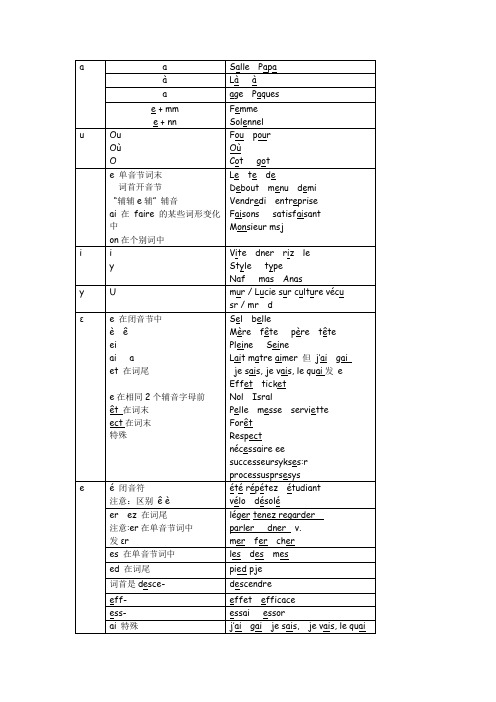
Accueilorgueil
Club t-shirtti∫rt
eu u 1词末开音节
2 z音前
3少数词中
1 deux nud /veux queue courageux feubleujeux heureux bufsb vu
2 vendeuse /creuser précieuse a. heureuse
successeursykses:rprocessusprsesys
e
é闭音符
注意:区别ê è
étérépétezétudiant
vélo désolé
er ez在词尾
注意:er在单音节词中
发εr
légertenez regarder
parler dnerv.
merfercher
es在单音节词中
lesdesmes
o
ter拿走v. / tt cte hpital m.o
au
注意:au在r前发
faute /chaud gaucheaugmenteraurore
eau
seau桶m. / beaueau水f. bureau
O 1.词末开音节
2. z前
注意:除以上2点o发
soloslo / stylométro
rose / chose∫oz
w
wagon少数区别w watt week-end大多数
∫
Ch
Sh外来词
Sch
Cherche cacher
Shampoing∫pw
Schéma
J
G在e i y前
JeuneJacqueline
Gêne logisgymnastique
法语发音规则
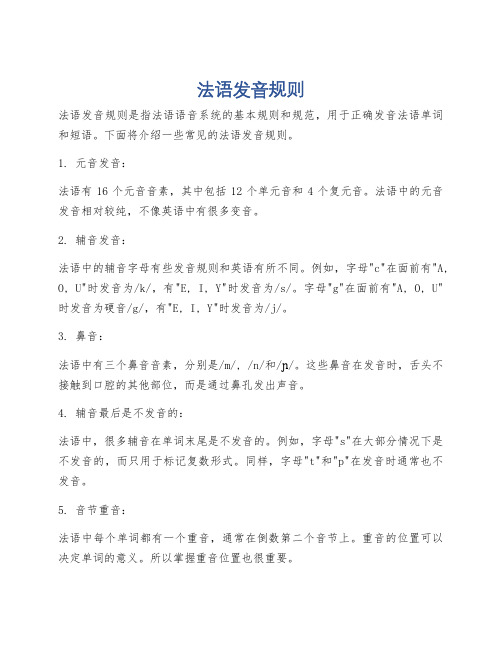
法语发音规则
法语发音规则是指法语语音系统的基本规则和规范,用于正确发音法语单词和短语。
下面将介绍一些常见的法语发音规则。
1. 元音发音:
法语有16个元音音素,其中包括12个单元音和4个复元音。
法语中的元音发音相对较纯,不像英语中有很多变音。
2. 辅音发音:
法语中的辅音字母有些发音规则和英语有所不同。
例如,字母"c"在面前有"A, O, U"时发音为/k/,有"E, I, Y"时发音为/s/。
字母"g"在面前有"A, O, U"时发音为硬音/g/,有"E, I, Y"时发音为/j/。
3. 鼻音:
法语中有三个鼻音音素,分别是/m/, /n/和/ɲ/。
这些鼻音在发音时,舌头不接触到口腔的其他部位,而是通过鼻孔发出声音。
4. 辅音最后是不发音的:
法语中,很多辅音在单词末尾是不发音的。
例如,字母"s"在大部分情况下是不发音的,而只用于标记复数形式。
同样,字母"t"和"p"在发音时通常也不发音。
5. 音节重音:
法语中每个单词都有一个重音,通常在倒数第二个音节上。
重音的位置可以决定单词的意义。
所以掌握重音位置也很重要。
以上是一些常见的法语发音规则。
通过学习这些规则并多加练习,可以帮助提高法语的发音准确性和流利度。
希望这些内容对你有所帮助。
法语发音规则:法语音标详解(附例词)
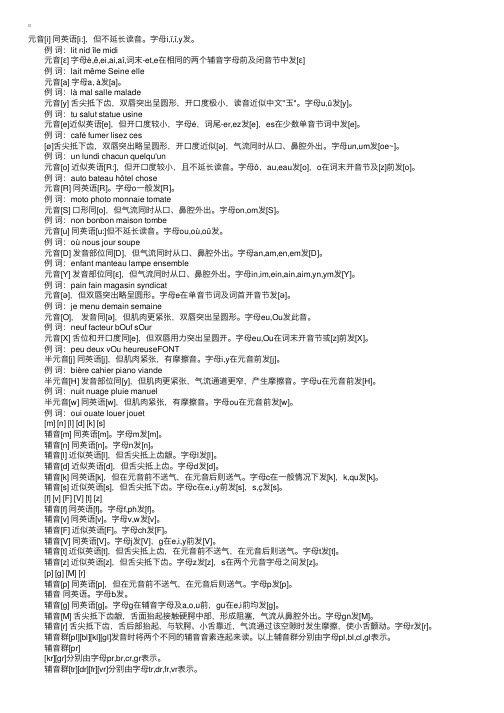
元⾳[i] 同英语[i:],但不延长读⾳。
字母i,ï,î,y发。
例词:lit nid île midi 元⾳[ε] 字母è,ê,ei,ai,aî,词末-et,e在相同的两个辅⾳字母前及闭⾳节中发[ε] 例词:lait même Seine elle 元⾳[a] 字母a, à发[a]。
例词:là mal salle malade 元⾳[y] ⾆尖抵下齿,双唇突出呈圆形,开⼝度极⼩,读⾳近似中⽂"⽟"。
字母u,û发[y]。
例词:tu salut statue usine 元⾳[e]近似英语[e],但开⼝度较⼩,字母é,词尾-er,ez发[e],es在少数单⾳节词中发[e]。
例词:café fumer lisez ces [ø]⾆尖抵下齿,双唇突出略呈圆形,开⼝度近似[ə],⽓流同时从⼝、⿐腔外出。
字母un,um发[oe~]。
例词:un lundi chacun quelqu'un 元⾳[o] 近似英语[R:],但开⼝度较⼩,且不延长读⾳。
字母ô,au,eau发[o],o在词末开⾳节及[z]前发[o]。
例词:auto bateau hôtel chose 元⾳[R] 同英语[R]。
字母o⼀般发[R]。
例词:moto photo monnaie tomate 元⾳[S] ⼝形同[o],但⽓流同时从⼝、⿐腔外出。
字母on,om发[S]。
例词:non bonbon maison tombe 元⾳[u] 同英语[u:]但不延长读⾳。
字母ou,où,oû发。
例词:où nous jour soupe 元⾳[D] 发⾳部位同[D],但⽓流同时从⼝、⿐腔外出。
字母an,am,en,em发[D]。
法语发音规则汇总版

oo
alcool
u
maximum [maksimm] (m.)
minimum
[o]
ter 拿走v. / tt cte hpital m.[o()]
au
注意:au在r前发[]
faute /chaud gaucheaugmenteraurore
eau
seau(桶m.) / beaueau(水f.) bureau
Vendredi entreprise
Faisons satisfaisant
Monsieur[msj]
[i]
i
y
Vite dner riz le
Style type
Naf mas Anas
[y]
U
mur / Lucie sur culture vécu
sr / mr d
[ε ]
e 在闭音节中
è ê
Battre librebifteck obligé
[t]
t
Tête site
[d]
d
double raide /datedurdomaine(领域m.)
[k]
C在a o u 及辅音字母前
qu
q
k
c在词尾
cc在a o u 前
cc在 e i 前读[ks]
ck
x 读[ks]
Carcommeculteclasse
Quel disque
Cinqcoq
Kakikilo
Lacsac
Occasion accord occupé
Succès accident
Ticket
Taxi texte
[g]
法语发音规则(从音到字母)

main
faim
plein
17
[ʒ]
j
g在e, i, y前
jeune
gêne
logis
35
[j]
i在元音前
y在词首
il词末,并在元音后
ill在元音后
cahier
yeux
réveil
travailler
18
[e]
é
er, ez在词尾
es在单音节词中
été
léger
tenez
les
gu在e, i前
gue
gare
gomme
guerre
guide
fugue
10
[n]
n
laine
28
[ã]
an, am, en, em后面没有元音字母或m, n
ancien
lampe
entrer
membre
11
[ə]
e: 1.单音节词末
2.词首开音节中
3.“辅辅e辅”中
le
debout
vendredi
zèle
poser
deuxième
15
[r]
r
revue
sur
33
[ø]
eu, oue: 1.词末开音节中
2.[z]音前
3.少数词中
deux, noeud
vendeuse
jeudi
16
[ʃ]
ch
cherche
cacher
34
[ε]
in, im, ain, aim, ein后面没有元音字母或m, n
pin
29
[ɔ]
法语发音规则

(1)重音:法语的重音比较固定,一般只落在单词的最后一个音节上。
节奏组:法语句子可以按照意义和语法结构划分为节奏组。节奏组一般以实词为主体,一切辅助词都和有关实词共同构成节奏组。每个节奏组中只有最后一个音节有重音,即重读音节。例如(下面例句中用重音符号标出重音节):
Ese-ce `que/ c'est Phi`lippe?/
词汇和句型部分:
Est-ce que c'est……这是……吗;oui,是的;Que fait-il,他是干什么的;Il est chercheur,他是研究 员;acteur,男演员;facteur,邮递员;journaliste,记者;styliste,服装设计师;Que fait-elle,她是干 什么的;actrice,女演员;factrice,女邮递员。
对话1:
-Qui est-ce?这是谁?
-C'est Pascal.这是Pascal。
-Où est-il?他在哪里?
-Il est à Calais.他在Calais。
对话2:
-Qui est-ce?这是谁?
-C'est Nathalie.她是Nathalie。
[f],(1)f,例如foule;(2)ph,例如photo。
[r],r,例如revue,sur。
[?],ch,例如cherche,cacher。
[?],(1)j,例如jeune;(2)g在e,i,y前,例如gêne,logis。
字母组合oi发音为[wa],例如loi,roi,toi。
-Oui, elle est économiste.是的,她是经济学家。
-Où habite-t-elle?她住在哪里?
- 1、下载文档前请自行甄别文档内容的完整性,平台不提供额外的编辑、内容补充、找答案等附加服务。
- 2、"仅部分预览"的文档,不可在线预览部分如存在完整性等问题,可反馈申请退款(可完整预览的文档不适用该条件!)。
- 3、如文档侵犯您的权益,请联系客服反馈,我们会尽快为您处理(人工客服工作时间:9:00-18:30)。
●Pure VowelsVowels in French are pure vowels, i.e. they are not diphthongs as in American English. Americans pronounce a and e with an extra yuh sound at the end, and o and u with an extra wuh sound at the end. You must not do this in French! The distinction between long and short vowels exists in French, but a few American short vowels do not exist ([ɪ] as in did and [ʊ] as in put) so make sure to never pronounce these vowels when speaking French. Also notice that the [æ] sound in cat does not exist in French either.Vowels in ContrastLong Vowels Short Vowels Similar English[a][ə]not - nut[i]---- sheep[e][ɛ]wait - wet[o][ɔ]coat - caught[u]---- moonWords in Contrast[a] - [ə]rapporter reporter[e] - [ə]des mains demain[e] - [ɛ]pré près[o] - [ɔ]paume pommeOn the other hand, French has three front rounded vowels that do not exist in English, which may take a while to get used to since English only has back rounded vowels. However, they are the rounded counterpart of vowels that do exist in English, so you simply need to round your lips when pronouncing these vowels.Vowels in ContrastUnrounded Rounded[i][e][ɛ]Many English speakers tend to say [u] instead of [y] and [ə] instead of [ø] or[œ]. Personally, I still find it very hard to hear the difference between [ø] and [œ] in fast speech, but I can distinguish them if they are isolated vowels.Words in Contrast[u] - [y]sous su[ə] - [ø]ce ceux[ø] - [œ]jeûne jeuneHere is a review of the vowels in French, with phonetic spellings for American English speakers (forget the diphthongs though!), sample words in French and the general spelling for these vowels in French orthography.Pure VowelsIPA Phoneticspelling Sample words General spellings[i]ee vie, midi, lit, riz i, y[e]ay blé, nez, cahier, piedé, et, final er and ez[ɛ]eh lait, aile, balai, reine e, è, ê, ai, ei, ais[a]ah chat, ami, papa, salade a, à, â[u]oo loup, cou, caillou, outil ou[o]oh eau, dos, escargot, hôtel o, ô[ɔ]aw sol, pomme, cloche, horloge o[ə]uh fenêtre, genou, cheval, cerise e[ɑ] is disappearing in modern French, being replaced by [a]. Vowels that do not exist in English are marked in blue. Other rules to remember about pure vowels in French:∙Vowels are pronounced slightly longer when they are in the final closed syllable (a consonant follows the vowels in the same syllable). For example, the vowel [i] in tir is longer than the vowel [i] in tirer because tir isa closed syllable, while ti is an open syllable (and rer is a closed syllable). This is represented with a colon inIPA: long [i] = [i:]∙The vowel [e] can only occur in open syllables (no consonant follows it in the same syllable) in French. In closed syllables, [ɛ] is used; however, [ɛ] can also be found in open syllables. (This is a major difference with English as [ɛ]can never be found in open syllables.)∙In stressed open syllables, only [ø] is possible. In stressed, closed syllables, only [œ] is possible, unless the syllable ends in [t], [tR], or [z] - in which case, [ø] can occur. In unstressed syllables, whether open or closed, either vowel can occur.∙Generally, [o] always occurs in stressed open syllables, and [ɔ] occurs in stressed closed syllables.Nevertheless,[o] can also occur in stressed closed syllables, depending on the spelling of the word: when the letter o is followed by [m], [n], [z]; when the letters au are not followed by [R]; and by the letter ô.●Semi-VowelsSemi-vowels can also be called glides or approximants.Semi-VowelsIPA Phoneticspelling Sample words General spelling[w]w fois, oui, Louis oi, ouew-ee lui, suisse ui[j]yuh oreille, Mireille ill, ySome words ending in -ille(r) pronounce the l, however:ville, mille, tranquille, distiller, osciller, etc.Words in Contrast[wa] - [a]loi la[ɥ] - [y]lui Lu[ej] - [e]pareil paré[aj] - [a]bail basNotice that words ending in -eil or -eille are pronounced [ej], while words ending in -ail or -ailleare pronounced [aj].●Nasal VowelsNasal vowels can be a bit tricky to understand in everyday speech, but learning how to pronounce them correctly isn't too difficult.Nasal VowelsIPA Phoneticspelling Sample words General spelling[œ̃] is being replaced with [ɛ] in European French; though this distinction is kept in Belgian and Quebecois FrenchWords in ContrastNasal Vowel Nasal Consonantfranc franchebrun bruneindien indiennebon bonneA phrase with all nasal vowels is: un bon vin blanc●ConsonantsMany of the consonants in French are very similar to the consonants in English. A fewdifferencesinclude:1.[p], [t] and [k] are NOT aspirated in French so try not to let that extra puff of air escape from your lips.2.Consonants that are alveolar in English are generally dental in French. Try to rest your tongue just behindyour teeth instead of on the alveolar ridge for [t], [d], [s], [z], [l] and [n].3.The letter h is never pronounced, but you need to remember to distinguish the h non-aspiré from the haspiré. Most words belong to the first group, but for the words that have an h aspiré, there are twocharacteristics that make them different: the definite article does not reduce to l' (called elision) but remains le or la and word boundaries are maintained so that sounds do not link (absence of liaison - see below). Most words with an h aspiré are of Germanic origin.h non-aspiréh aspirél'habitude la hachel'herbe le halll'heure le haricotl'histoire le hasardl'homme le hiboul'honneur le homardl'huile le hockey4.[R] is articulated further back in the throat (with the back of the tongue) and is usually the hardest Frenchconsonant for English speakers to pronounce correctly. It is a voiced uvular fricative sound and does not have an effect on preceding vowels the way that American English r does. It must remain consistent in all positions, regardless of the other vowels and consonants that may be adjacent to it.Initial AfterconsonantIntervocalic Beforeconsonant Finalrusé droit arrêt partout merrang gris courir merle pirerose trou pleurer corde sourd5.In the majority of words with the grapheme ch, the pronunciation is [ʃ], but it is also pronounced [k] inwords of Greek origin. Itissilent, however, in theword almanach.ch = [ʃ]ch = [k]chercher archéologieréchauffer chaoschérubin chrétienarchitecte échocatéchisme orchestreAchille chœur6.The graphemes gu and qu can be pronounced three different ways: [g], [gw], [gɥ] and [k], [kw], [kɥ],respectively. The majority of words are pronounced with simply [g] and [k], but the spelling will not tell you which sound to pronounce, so you'll just have to learn them individually.[g][gw][gɥ][k][kw][kɥ]anguille jaguar aiguille question adéquat quiescentfatigue iguane ambiguïté qualité aquarium équilatéralguérilla lingual linguiste équivalent square ubiquitédistinguer Guadeloupe quartier équateur équidistant7.Even though most final consonants are not pronounced in French (see below), there are a few exceptions,especially with words ending in -s. In words ending in a consonant + s or -es, the s is silent. However, if a word ends in -as, -ès, -is, -os, or -us, then the s is sometimes pronounced.s = silent s = pronouncedcadenas atlasdébarras pancréasaccès aloèsexprès palmarèslogis oasisclos visdessous albatrosconfus sinusdehors ours●Silent LettersFrench, like English, is not written phonetically. Vowels can be represented by several different letter combinations and many letters are actually not pronounced. (You can thank early "linguists" who changed the spelling of many French words, with complete disregard to pronunciation, so that it was closer to Latin orthography.)∙The final consonant of many words is silent. Sometimes a final c, f, l or r are pronounced though.Final c, f, l, r silentblanc cléf outil parlerfranc cerf sourcil cherchertabac nerf gentil habiterestomac persil fermerFinal c, f, l, r pronouncedbouc œuf fil carlac sauf avril meravec veuf civil pourdonc actif col hiver∙Similar to English, the final -e in most words is not pronounced. For feminine adjectives and nouns, this generally means that the final consonant of the masculine form will now be pronounced.Masculine Femininevert ver t egrand gran d ecanadien canadie nn eboulanger boulangèr echat cha tt e∙As mentioned above, a few silent letters were placed in French orthography for the prestige of being more similar to Latin. Other letters are now silent for other historical reasons (i.e. perhaps the pronunciationchanged, but the spelling did not.) The followingwords all havesilentletters:se pt ran g fi ls tro prom pt san g pou ls cam paspe ctœi l saou l chocola tinstin ct fauteui l cu l crédi tpie d ai l Renau l t ri zni d dra p siro p ne zA few plural nouns change their pronunciations to include silent letters, whereas these consonants arepronounced in the singular form:unœuf des œu fsunbœuf des bœu fsunos des o s●ecaducLa loi des troisconsonnes states that [ə] may be omitted in pronunciation as long as it would not cause three consonants to be together. Of course there are exceptions to this rule, and some dialects of French do not delete it anyway (such as in the south of France.) However, this is extremely common in everyday French and English speakers need to be able to comprehend words with dropped syllables.Phrase-final e is always dropped, except in -le in the imperative. It is also dropped at the end of nouns, articles and verbs. One exception to the three consonant rule is in the case of consonant clusters, such as br, fr, gr, pr, tr, etc. If the e precedes these clusters, and the e itself is preceded by a consonant, then it can be dropped: un refrain = un r'frainDisappearing eCareful Speech Normal Speechsamedi / lentement / sauvetage sam'di / lent'ment / sauv'tagesous le bureau / chez le docteur sousl'bureau / chezl'docteuril y a de / pas de / plus de il y a d' / pas d' / plus d'je ne / de ne / tu ne je n' / de n' / tu n'je te / ceque / cequi j'te / c'que / c'quiNotice that dropping e in je also results in [ʒ] to become [ʃ] whenever it is found before voiceless consonants, such as [p], [t], [k], etc.●LiaisonA loss of word boundaries in French makes it difficult to comprehend the spoken language for beginning learners. All of the words seem to be linked together without any clear divisions because the syllable boundaries do not correspond to the word boundaries. In many cases, the last consonant from one syllable (which is usually silent) will become the first consonant of the next syllable (therefore, it is no longer silent). This linking between syllables is called liaison, and it may or may not be required and the pronunciation of the consonant may or may not change. Liaison leads to many homonymous phrases, which can hinder comprehension. You must pay attention to the liaisons in verb conjugations as well or you may mistake one verb for another.The consonants involved in liaison generally include d, s, and x. However, their pronunciation is changed so that they become [t], [z] and [z], respectively. The letter n that is written after nasal vowels becomes the nasal consonant [n]. Peculiarly, the f of neuf is pronounced [v] only before ans and heures and in all other cases, it remains [f]. And remember that h aspiré prevents liaison from happening, i.e. there is no [z] sound between des and haricots.Examplesof Liaisonelle sa rrivent mo na mouril so nt le s o ursvieu xa rbres dan su nsacdi x h eures trèsa imableatten d-i l ? plu s o uvertgran da mi iles ta lléThere are a few instances when you should always use liaison (liaison obligatoire):1.afterdeterminers: un, les, des, ces, mon, ton, quels, etc.2.before or after pronouns: nous, vous, ils, elles, les, etc.3.after preceding adjectives: bon, mauvais, petit, grand, gros, etc.4.after monosyllabic prepositions: chez, dans, sous, en, etc.5.after some monosyllabic adverbs: très, plus, bien, etc. (optional after pas, trop, fort)6.after est (optional after all other forms of être)●StressFrench is a syllable-timed language, so equal emphasis is given to each syllable. This is quite unlike English, which is a stress-timed language, and which gives emphasis to one syllable in each word - the stressed syllable - and reduces the vowels in the rest of the syllables (usually to [ə] or [ɪ].) All vowels in French must be pronounced fully, and each syllable must be pronounced with equal stress, though the final syllable of each word is generally considered the "stressed syllable."Listen to these words in English and French and see if you can hear the difference in stress. Stressedsyllables in English aremarked in bold.∙pho to graphy - photographie∙au tho rity - autorité∙natio na lity - nationalité∙pa ssion - passion∙edu ca tion - éducation∙re giment - régiment∙mon ument - monument∙melodra ma tic - mélodramatique●IntonationIntonation in French is slightly different from English. In general, the intonation rises only for a yes/no question, and the rest of the time, the intonation falls. French intonation starts at a higher pitch and falls continuously throughout the sentence, whereas in English, the stressed syllable has a higher pitch that what precedes and follows it.Listen to these sentences in English and French and see if you can hear the difference in intonation. Bold marks the higher pitch. Notice that even if the intonation pattern seems similar, the syllables with higher pitches are often in different locations. The numbers below refer to the pitch: 1) low, 2) medium, 3) high, 4) extra high.English Intonation vs. French IntonationSentence Type English Intonation French IntonationYes/NoQuestion Are you leaving? 2 - 3 Est-cequevouspar tez ? 2 - 3Information Question Whereareyou go ing? 2 - 3 - 1 Où est-cequevousallez ? 4 - 2 - 1Imperative Do it. / Don't do it. (2) - 3 - 1 Fais-le. / Ne le fais pas. 4 - 2 - 1Exclamation What a sur pri se! 2 - 3 - 1 Quelle surprise ! 4 - 2 - 1Declarative I bought a dre ss. 2 - 3 - 1 J'ai achetéunerobe. 3 - 2 - 1● Informal ReductionsIn everyday speech, there are other reductions in addition to e caduc. Many of these reductions are made for ease of pronunciation and are considered informal. The most common ones are reducing tu to t' before a vowel and omitting the final syllable of words ending in -re. Listen to these reductions in careful speech and everyday speech:Informal Reductions in Spoken FrenchCareful Speech Everyday Speechtu es t'estu as t'astu étais t'étaistu avais t'avaismettre mett'notre not'autre aut'il yil y a y ails + vowel y'zelle èelles + vowel è'zparceque pasq'quelque quèq'puis pis。
